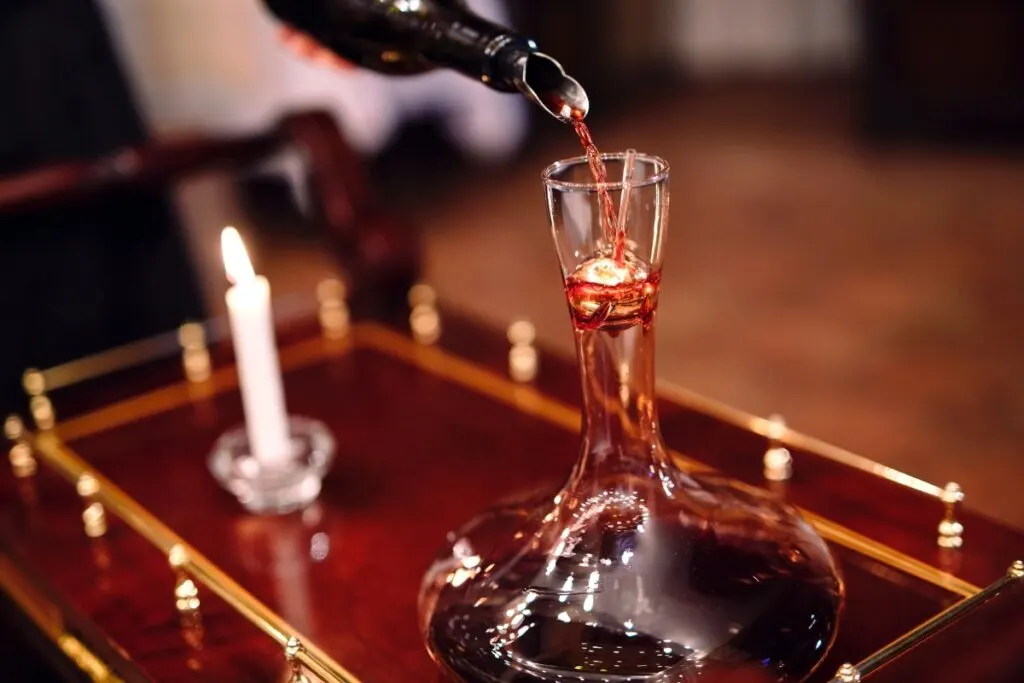As an Amazon Associate, I earn from qualifying purchases with no additional costs for you.
If you like wine, then this question has undoubtedly occurred to you. What types of wines need to be decanted, and which do not?
Generally, younger red wines and some white wines do not need to be decanted, while older red wines and certain white wines can benefit from decanting. However, there are no hard and fast rules, as the need for decanting can vary based on the specific wine and personal preference.
Read below for more tips on what types of wines need to be decanted and what wines do not.

TIP: If you want to check out the best refrigerator for wine storage, I recommend trying out the Avation (18 bottles) compressor refrigerator with Wi-fi smart app control cooling system. You can find this refrigerator by clicking here (Amazon link).
Recommendation box: Everything you need to enjoy your wine as much as possible. All recommended products are personally tested and regularly used by experts from this website (Amazon links):
> Ivation Wine Cooler – Energy-efficient wine cooler for 18 bottles with Wi-fi smart app control cooling system.
> Wine Rack – Beautiful, elegant wood rack for up to 7 bottles and the choice of vertical or horizontal storage.
> Durand Wine Opener – Classic vintage wine opener (we like all these classic staff).
> YouYah Iceberg Wine Decanter – The most beautiful and handy wine decanter we personally use.
> Bormioli Rocco Wine Glasses – A set of eight elegant and traditional wine glasses made in Italy.
> Vintorio Wine Aerator – Simple but really useful wine aerator for a reasonable price.
> The Original Vacu Vin Wine Saver – The best wine saver on the market in a package with two vacuum stoppers and two wine servers.
And if you want to become a true connoisseur of wine, we recommend reading the book Wine Folly: The Essential Guide to Wine (Amazon link), where you will find all the information you need about winemaking, wine varieties, flavors, and much more.
Can All Wines be Decanted
Technically, all wines can be decanted, but not all wines necessarily benefit from the process. Decanting is generally used for red wines, especially those with high tannin levels, sediment, or older ones.
However, certain white wines and even some rosés can also be decanted to allow them to open up and develop more complex flavors.
TIP: Most wines go bad once you pop the cork within a day or so. But a Coravin Wine Preservation system (available for a great price on Amazon) can extend the life of your opened wine for weeks or even months. It is awesome. You should check it out to see if it fits your lifestyle.
Decanting can generally help to aerate and soften wines, bringing out more aromas and flavors. However, decanting may be too aggressive for lighter wines or those with delicate flavors and can cause the wine to lose some of its subtleties.
So, while technically all wines can be decanted, it’s generally recommended only to decant those wines that will benefit from the process and to consult with a sommelier or wine expert if needed. You can also keep reading to learn which wines will benefit most from decanting!
TIP: If you are interested in buying a wine decanter, I recommend purchasing these two top-quality decanters:
- USBOQO Wine Decanter (check it out on Amazon & read customer reviews)
- Iceberg Wine Decanter (check it out on Amazon & read customer reviews)
What Wines Should You Decant
Red and white wines can both benefit from decanting. Red wines that may benefit from decanting include full-bodied and tannic wines such as:
- Cabernet Sauvignon,
- Syrah,
- Bordeaux blends.
Older wines with sediment that need to be separated before serving are also on the list of red wines that need to be decanted. Young wines that need aeration to soften their tannins and release their aromas and flavors must also be decanted.
Specifically, White wines that may benefit from decanting include full-bodied white wines like oaked Chardonnay and some aged white wines that have developed sediment or need aeration to express their flavors fully.
TIP: Can you put a wine decanter in the dishwasher? A dishwasher is not ideal, considering the decanter’s age, shape, size, and quality. Check out the best way to clean your wine decanter in this article. Read this article to discover if you can store opened wine in mason jars – the answer might surprise you!
Which Wines Should Not Be Decanted

Lighter red wines like Pinot Noir and Beaujolais typically do not need to be decanted, as they have fewer tannins and a shorter aging process.
Similarly, most younger white wines and rosé wines do not need to be decanted, as they do not have as much tannin or sediment.
Do You Need to Decant Cheap Wine
Whether or not you need to decant a cheap wine depends on the specific wine and your preference. More affordable wines, especially those meant to be consumed young, do not necessarily benefit from decanting.
The main reason to decant a wine is to aerate it, which can help to soften harsh tannins and release the wine’s aromas and flavors.
However, cheaper wines typically have less tannin and are meant to be consumed while still young and fresh. Therefore, they may not need more decanting than older or more full-bodied wines.
TIP: Are you interested in buying a wine stopper? We’ve personally tried and recommend buying one of these wine stoppers (Amazon links):
- The Original Vacu Vin Wine Saver: Our top choice. Very easy-to-use wine stopper/saver. You can enjoy a glass of fresh wine whenever you want without worrying about wasting any.
- EZBASICS Wine Saver: Great alternative to Original Vacu Vin Saver. This wine stopper keeps the flavor of wine for up to one week.
- Champagne Stopper by MiTBA: Wine stoppers for sparkling wines are different. This wine stopper seals your bottle and increases the pressure so your beverage’s bubbles won’t go to waste.
However, there may still be some cheap wines that could benefit from decanting, mainly if they are particularly tannic or if they have some sediment.
Additionally, if you find that cheap wine is very closed off or tight when you first open it, decanting can help to open it up and reveal more of its character.
Ultimately, whether or not to decant a cheap wine is a matter of personal preference. If you enjoy the process of decanting and find that it enhances the wine’s flavor, then by all means, go ahead and decant it. But if you find the wine perfectly enjoyable straight out of the bottle, there may be no need to decant.
TIP: Does a wine decanter need a stopper? Decanters with stoppers are only helpful if you often do not finish your decanted wine. Find out more in this article. Is there really a difference between cheap and expensive wines? Find out here.
Can You Decant Half a Bottle of Wine
Yes, you can decant a half bottle of wine, although it may not be necessary for a wine that small. Decanting is typically done to aerate and separate a larger volume of wine from sediment, so for a half bottle (375 ml), there may not be enough wine or sediment to make decanting necessary.
However, decanting can still be helpful if you have a half bottle of an older red wine that has developed sediment. Just be aware that with such a small volume of wine, you’ll need to be careful not to over-aerate it, which can cause it to lose some of its character.
When decanting a half bottle of wine, it’s best to use a small decanter to accommodate the smaller volume.
You may also want to adjust how much time you allow the wine to breathe since a smaller volume of wine will generally require less time to aerate.
If you are unsure whether to decant a half bottle of wine, consulting a sommelier (wine expert) is always a good idea to advise you on the best approach for that particular wine.
TIP: Both wine decanters and wine aerators are standard tools used to enhance the wine. Check out the difference between decanters and aerators in this article. Read this practical guide to discover how long you can decant wine without ruining it.
Conclusion
Now that we have learned precisely what wines need to be decanted and what wines do not, let’s recap exactly what it means to decant wine and why you would want to do it in the first place.
To decant a wine means to pour it from its original bottle into another container, typically a glass or crystal decanter, before serving. Decanting is to aerate the wine and separate it from any sediment that may have accumulated in the bottle.
This is because when wine ages, it can develop sediment, a natural byproduct of aging. Sediment comprises tiny particles of grape skins, stems, and seeds that have fallen to the bottom of the bottle. If the sediment is not removed before serving, it can create a bitter or gritty taste in the wine.
Aeration is the other main reason to decant a wine. Aeration allows the wine to breathe and softens any harsh tannins that may be present. This process also allows the wine’s flavors and aromas to develop fully, enhancing the overall drinking experience.
The bottle is typically opened to decant a wine, and the neck is held over a light source to check for sediment.
The wine is then slowly poured into the decanter, not disturbing the sediment at the bottom of the bottle. Once the wine is in the decanter, it is left to breathe for a period, which can vary depending on the wine and personal preference.
Overall, decanting wine is a process that helps improve its taste and aroma, as we learned n the article above.
It is often recommended for older or full-bodied red wines, young wines that need to soften their tannins and release their aromas and flavors, those with tannins and sediment, and those considered tight or closed-off when you first open it.
Sometimes, decanting a wine can be seen as a ritual or a way to enhance your entire wine experience. In other words, some see decanting wine as less necessary and more of a show. That is why you can find wine decanters on many wedding registry lists and inexpensive retailers such as Crate and Barrel!
TIP: Check out this page for a complete list of wine products and accessories I love. You’ll find my recommendations for wine refrigerators, decanters, and aerators and the best place to buy wine online. Click here to see the complete listing.
